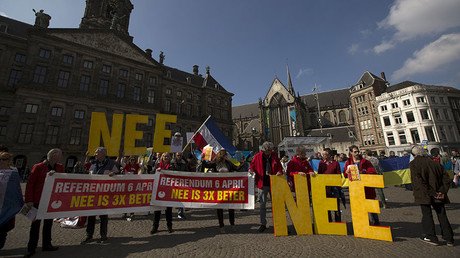Polls have opened on Wednesday in the Netherlands to see if the public wants to back an agreement to bring Ukraine closer to the EU. While many Dutch people support ordinary Ukrainians, a great number believe the proposed deal will not help them.
At The Hague, members of the “No” camp have been out in force trying to convince the general public not to vote in favor of the EU’s proposed association agreement with Kiev. Despite their efforts, however, even many of those opposing the deal have expressed an underlying desire to help Ukraine’s general population.
“This [treaty] will not help the ordinary citizen in Ukraine,” Harry van Bommel, an MP with the Socialist Party, told RT. “It will help the oligarchs, it will help Poroshenko and it will help the others. I am willing and the Dutch are willing to help Ukrainians, but we can do that through neighborhood policy and all sorts of funds that are available already,” he added.
Many Dutch people have voiced concern as to just how ordinary Ukrainians would benefit from the association agreement. Though the pact would essentially give Ukrainians visa-free travel within the vast majority of the EU, it would also break down free trade barriers, which, according to Jan Roos from the GeenStjil (No Style) magazine, would be of little benefit to the vast majority of those living in Ukraine.
“There is no trade between the Netherlands and Ukraine. The Ukrainian people are very poor so they can’t buy our tulips or our cheese,” Roos explained. “But I want the best for the Ukrainian people and I want them to live in peace. There is a war going on there, which was caused by this association agreement.”
Roos was a key figure in the movement that collected more than 450,000 signatures to force the Netherlands into holding a non-binding referendum concerning the EU’s planned association agreement with Kiev. Under Dutch law, any petition gaining more than 300,000 triggers a vote.
“I want them to have freedom, I want them to have rights, but this treaty won’t give them that,” Roos admitted. “We want some changes around here and that is why I hope that the people will vote ‘No.’ It is a very bad idea to have an association treaty with the most corrupt country in Europe – Ukraine,” he added.
Opposition to the association agreement in the Netherlands is not just directed at Ukraine in particular, but is also seen as a way of forcing the Dutch government to consult with the public when taking decisions.
There is also anger at EU policies concerning Ukraine, which often result in Brussels making promises to Kiev that it cannot keep in the long run.
“During Maidan, we had two European politicians who got involved and said ‘we are going to be helping Ukraine,’ but what happened? Actually things got worse in Ukraine. A war started because of their involvement. I think that’s very concerning,” said activist Daniel Klop, who spoke to RT.
Klop added that he believes that the EU is putting its own ambitions above the welfare of the Ukrainian people.
“I do get the impression that Europe is trying to expand. They want to have that influence and they are trying to get more influence in the world and I also think they are trying to get more influence over Ukraine and I think this will be detrimental to us because of this conflict, which is currently occurring in Ukraine,” he said.
Willem Ruitenberg from the Citizens committee, who is also campaigning for a “No” vote, went even further, saying that he was “a slave of the EU, who wants to get bigger.”
“I don’t trust the EU anymore because their secret agenda is first to get bigger themselves, secondly it is to have very close ties to Ukraine,” he said.
The Dutch government would not be forced to veto the agreement if the “No” vote does triumph in Wednesday’s referendum. However, with the Netherlands currently holding the EU presidency, and elections due to take place in less than a year, it would put pressure on Rutte and his coalition not to go against the will of the people.
A poll carried out by Maurice de Hond on Sunday showed that 66 percent of Netherlanders say they will definitely vote “No,” with only 25 percent supporting the “Yes” campaign, according to Reuters.
In order for the referendum to be considered valid, 30 percent of the Dutch population eligible to vote must cast their ballots. A TNS Nipo poll has forecast a turnout of 32 percent.

